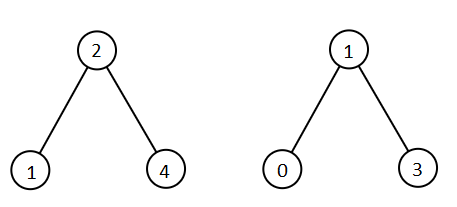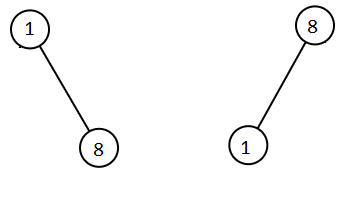티스토리 뷰
Problem
Given two binary search trees root1 and root2, return a list containing all the integers from both trees sorted in ascending order.
Example 1:

Input: root1 = [2,1,4], root2 = [1,0,3]
Output: [0,1,1,2,3,4]Example 2:

Input: root1 = [1,null,8], root2 = [8,1]
Output: [1,1,8,8]Constraints:
- The number of nodes in each tree is in the range [0, 5000].
- -10^5 <= Node.val <= 10^5
Solution
두 개의 이진트리의 루트노드가 주어질 때 두 트리의 모든 노드를 오름차순으로 정렬해 반환하는 문제입니다.
간단하게 생각하면 두 트리를 모두 탐색하면서 리스트에 넣고 마지막에 리스트를 정렬해서 반환하면 되는데요, 그래서 그런지 Medium 난이도 문제이지만 정답률이 매우 높습니다.
import io.lcalmsky.leetcode.TreeNode;
import java.util.ArrayList;
import java.util.Collections;
import java.util.List;
public class Solution {
public List<Integer> getAllElements(TreeNode root1, TreeNode root2) {
List<Integer> result = new ArrayList<>();
travel(result, root1); // (1)
travel(result, root2); // (2)
Collections.sort(result); // (3)
return result;
}
private void travel(List<Integer> result, TreeNode node) {
if (node == null) {
return;
}
result.add(node.val);
travel(result, node.left);
travel(result, node.right);
}
}- 첫 번째 이진트리를 탐색하면서 노드의 값을 리스트에 추가합니다.
- 두 번째 이진트리를 탐색하면서 노드의 값을 리스트에 추가합니다.
- 오름차순으로 정렳합니다.
이렇게 제출하면 당연히 문제 의도에 맞지 않을 거라고 생각했는데 의외로 좋은 성적으로 통과가 되네요. 😅
#₩ Test
package io.lcalmsky.leetcode.all_elements_in_two_binary_search_trees;
import static org.junit.jupiter.api.Assertions.assertAll;
import static org.junit.jupiter.api.Assertions.assertEquals;
import io.lcalmsky.leetcode.TreeNode;
import java.util.List;
import org.junit.jupiter.api.Test;
class SolutionTest {
@Test
void testAll() {
assertAll(
() -> test(TreeNode.of(2, 1, 4), TreeNode.of(1, 0, 3), List.of(0, 1, 1, 2, 3, 4)),
() -> test(TreeNode.of(1, null, 8), TreeNode.of(8, 1), List.of(1, 1, 8, 8))
);
}
private void test(TreeNode root1, TreeNode root2, List<Integer> expected) {
// when
Solution solution = new Solution();
List<Integer> actual = solution.getAllElements(root1, root2);
// then
assertEquals(expected, actual);
}
}TreeNode.java 전체 보기
package io.lcalmsky.leetcode;
import java.util.ArrayList;
import java.util.Collections;
import java.util.LinkedList;
import java.util.List;
import java.util.Objects;
import java.util.Queue;
import java.util.StringJoiner;
public class TreeNode {
public int val;
public TreeNode left;
public TreeNode right;
public TreeNode(int x) {
val = x;
}
public static TreeNode of(Integer... array) {
if (array == null || array.length == 0) {
throw new IllegalArgumentException();
}
Queue<TreeNode> treeNodeQueue = new LinkedList<>();
Queue<Integer> integerQueue = new LinkedList<>();
for (int i = 1; i < array.length; i++) {
integerQueue.offer(array[i]);
}
TreeNode treeNode = new TreeNode(array[0]);
treeNodeQueue.offer(treeNode);
while (!integerQueue.isEmpty()) {
Integer leftVal = integerQueue.poll();
Integer rightVal = integerQueue.isEmpty() ? null : integerQueue.poll();
TreeNode current = treeNodeQueue.poll();
if (leftVal != null) {
TreeNode left = new TreeNode(leftVal);
assert current != null;
current.left = left;
treeNodeQueue.offer(left);
}
if (rightVal != null) {
TreeNode right = new TreeNode(rightVal);
assert current != null;
current.right = right;
treeNodeQueue.offer(right);
}
}
return treeNode;
}
@Override
public String toString() {
return new StringJoiner(", ", TreeNode.class.getSimpleName() + "[", "]")
.add("val=" + val)
.add("left=" + left)
.add("right=" + right)
.toString();
}
public static void print(TreeNode treeNode) {
BTreePrinter.printNode(treeNode);
}
@Override
public boolean equals(Object o) {
if (this == o) {
return true;
}
if (!(o instanceof TreeNode)) {
return false;
}
TreeNode treeNode = (TreeNode) o;
return val == treeNode.val &&
Objects.equals(left, treeNode.left) &&
Objects.equals(right, treeNode.right);
}
@Override
public int hashCode() {
return Objects.hash(val, left, right);
}
static class BTreePrinter {
public static void printNode(TreeNode root) {
int maxLevel = BTreePrinter.maxLevel(root);
printNodeInternal(Collections.singletonList(root), 1, maxLevel);
}
private static void printNodeInternal(List<TreeNode> nodes, int level, int maxLevel) {
if (nodes.isEmpty() || BTreePrinter.isAllElementsNull(nodes)) {
return;
}
int floor = maxLevel - level;
int edgeLines = (int) Math.pow(2, (Math.max(floor - 1, 0)));
int firstSpaces = (int) Math.pow(2, (floor)) - 1;
int betweenSpaces = (int) Math.pow(2, (floor + 1)) - 1;
BTreePrinter.printWhitespaces(firstSpaces);
List<TreeNode> newNodes = new ArrayList<>();
for (TreeNode node : nodes) {
if (node != null) {
System.out.print(node.val);
newNodes.add(node.left);
newNodes.add(node.right);
} else {
newNodes.add(null);
newNodes.add(null);
System.out.print(" ");
}
BTreePrinter.printWhitespaces(betweenSpaces);
}
System.out.println();
for (int i = 1; i <= edgeLines; i++) {
for (TreeNode node : nodes) {
BTreePrinter.printWhitespaces(firstSpaces - i);
if (node == null) {
BTreePrinter.printWhitespaces(edgeLines + edgeLines + i + 1);
continue;
}
if (node.left != null) {
System.out.print("/");
} else {
BTreePrinter.printWhitespaces(1);
}
BTreePrinter.printWhitespaces(i + i - 1);
if (node.right != null) {
System.out.print("\\");
} else {
BTreePrinter.printWhitespaces(1);
}
BTreePrinter.printWhitespaces(edgeLines + edgeLines - i);
}
System.out.println();
}
printNodeInternal(newNodes, level + 1, maxLevel);
}
private static void printWhitespaces(int count) {
for (int i = 0; i < count; i++) {
System.out.print(" ");
}
}
private static int maxLevel(TreeNode node) {
if (node == null) {
return 0;
}
return Math.max(BTreePrinter.maxLevel(node.left), BTreePrinter.maxLevel(node.right)) + 1;
}
private static <T> boolean isAllElementsNull(List<T> list) {
for (Object object : list) {
if (object != null) {
return false;
}
}
return true;
}
}
}'Algorithm > LeetCode' 카테고리의 다른 글
| 1672. Richest Customer Wealth (0) | 2022.02.03 |
|---|---|
| 211. Design Add and Search Words Data Structure (0) | 2022.02.01 |
| 1291. Sequential Digits (0) | 2022.01.30 |
| 941. Valid Mountain Array (0) | 2022.01.29 |
| 520. Detect Capital (0) | 2022.01.28 |
댓글
공지사항
최근에 올라온 글
최근에 달린 댓글
- Total
- Today
- Yesterday
링크
TAG
- gRPC
- proto3
- 함께 자라기 후기
- QueryDSL
- spring boot jwt
- Linux
- intellij
- 클린 아키텍처
- 스프링 데이터 jpa
- Spring Boot Tutorial
- spring boot app
- 스프링 부트
- @ManyToOne
- Java
- 스프링 부트 애플리케이션
- leetcode
- 알고리즘
- JPA
- Spring Boot
- Spring Boot JPA
- spring boot application
- 스프링부트
- 헥사고날 아키텍처
- JSON
- Jackson
- 함께 자라기
- Spring Data JPA
- 스프링 부트 튜토리얼
- r
- 스프링 부트 회원 가입
| 일 | 월 | 화 | 수 | 목 | 금 | 토 |
|---|---|---|---|---|---|---|
| 1 | 2 | 3 | ||||
| 4 | 5 | 6 | 7 | 8 | 9 | 10 |
| 11 | 12 | 13 | 14 | 15 | 16 | 17 |
| 18 | 19 | 20 | 21 | 22 | 23 | 24 |
| 25 | 26 | 27 | 28 | 29 | 30 | 31 |
글 보관함
